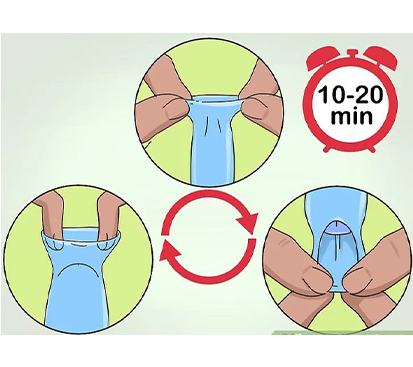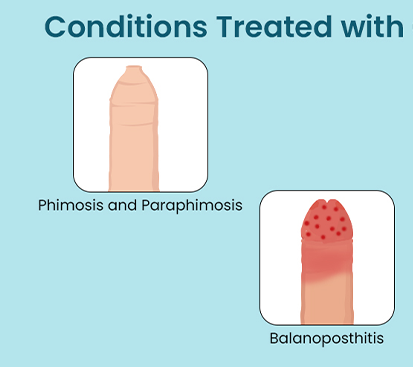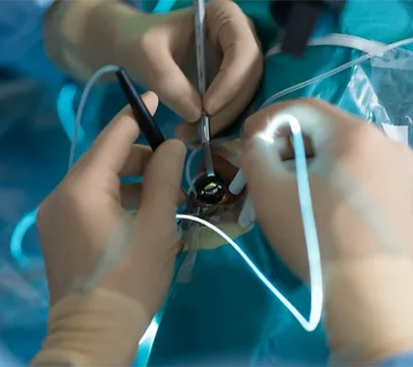
Tight Foreskin can significantly impact daily life, particularly when it leads to pain, discomfort, or difficulty in cleaning the area. Individuals with tight foreskin may experience swelling, redness, or even cracks in the skin, making it challenging to maintain proper hygiene. In some cases, phimosis may cause ballooning of the foreskin during urination or lead to repeated urinary tract infections (UTIs). If left untreated, the condition may worsen over time, increasing the risk of severe infections or conditions like paraphimosis. Our specialists at the tight foreskin treatment hospital in Kolathur and tight foreskin clinic in Mogappair offer expert care to diagnose and manage phimosis effectively, ensuring patients experience improved comfort and better hygiene.
Our treatment approach is tailored to the severity of your condition. For mild cases, we recommend conservative treatments such as topical steroid creams, stretching exercises, and hygiene guidance to improve foreskin flexibility. However, when conservative methods are ineffective or if the condition becomes severe, surgical intervention may be necessary. We specialize in advanced procedures such as laser circumcision and stapler circumcision, which provide precise results, minimal pain, and faster recovery. Our dedicated team ensures compassionate care throughout your treatment journey, prioritizing your comfort, safety, and long-term well-being.
Our specialized team at the tight foreskin treatment hospital in Kolathur and Mogappair is dedicated to providing comprehensive care from diagnosis to recovery. We understand that phimosis can be a sensitive concern, and we prioritize patient comfort by offering personalized treatment plans. Our advanced diagnostic methods help assess the severity of the condition, enabling us to recommend the most suitable treatment option. Whether through non-surgical treatments or advanced surgical procedures like laser circumcision or stapler circumcision, we ensure minimal discomfort and optimal results. With a focus on post-treatment care, our team offers detailed guidance to promote faster healing, reduce the risk of recurrence, and improve overall foreskin health.
Recognizing the signs of a tight foreskin early can help prevent complications and ensure timely treatment. Individuals with phimosis may experience discomfort or pain during everyday activities such as urination, sexual intercourse, or cleaning the genital area. Common symptoms often include redness, swelling, and irritation around the foreskin and glans. In some cases, phimosis can cause the foreskin to become stuck, making it difficult to retract, which may lead to hygiene issues and infection risks. If left untreated, phimosis can result in painful erections, restricted blood flow, or even scarring, further complicating the condition. Identifying these symptoms early and seeking medical guidance is crucial for effective treatment and improved comfort.

If you notice any of these symptoms, it's essential to seek medical attention at our tight foreskin treatment hospital in Kolathur or tight foreskin clinic in Mogappair. Our specialists provide expert diagnosis and customized treatment plans to ensure effective relief. Early intervention can help prevent severe complications and promote better foreskin health.
Surgical intervention is recommended when phimosis becomes severe, causing significant discomfort, infection, or complications that do not respond to conservative treatments. While mild cases may improve with medications or stretching techniques, persistent or worsening symptoms often require surgical care. Surgery may also be necessary when phimosis leads to issues such as difficulty urinating, painful erections, or recurrent infections. Without timely intervention, tight foreskin can restrict blood flow to the penile head, posing a serious risk to overall penile health. At our tight foreskin treatment hospital in Kolathur and tight foreskin clinic in Mogappair, we specialize in providing advanced surgical solutions to ensure effective relief and improved well-being.


Our expert surgeons perform precise procedures such as circumcision or dorsal slit surgery, ensuring minimal pain, faster recovery, and improved foreskin mobility. These advanced techniques are designed to deliver long-term relief and reduce the risk of recurring issues.
By choosing our specialized surgical services, patients receive comprehensive care tailored to their specific needs. Our team prioritizes patient comfort and safety, providing expert guidance throughout the recovery process to ensure positive outcomes and improved foreskin health.
Accurate diagnosis is essential to identify the severity of phimosis and determine the most suitable treatment approach. Our experienced specialists at the tight foreskin treatment hospital in Kolathur and tight foreskin clinic in Mogappair utilize advanced diagnostic tools to assess your condition thoroughly. Through a combination of physical examination and medical history evaluation, we develop a personalized treatment plan that ensures effective results. Early diagnosis allows for conservative treatments, while severe cases may require surgical intervention for lasting relief and improved foreskin mobility.
- Topical steroid creams to reduce inflammation and soften the foreskin
- Gentle stretching exercises to improve foreskin flexibility
- Oral medications to manage infections or inflammation
- Laser circumcision for a precise, minimally invasive procedure
- Stapler circumcision for faster recovery and reduced post-surgical pain
- Dorsal slit surgery for cases of severe foreskin tightness
- Comprehensive post-treatment care for improved healing
- Lifestyle and hygiene guidance to prevent recurrence

Our team prioritizes patient comfort, ensuring treatments are customized to address individual concerns. Whether managing mild phimosis with conservative options or performing advanced surgical procedures, we focus on delivering safe, effective solutions. With expert care and dedicated follow-up, we ensure optimal recovery, improved foreskin health, and a reduced risk of future complications.